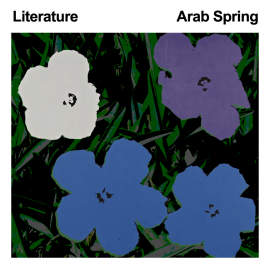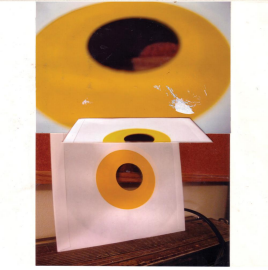Print Edition: January 11, 2012
Literature
Arab Spring
Literature’s first full-length album, Arab Spring, is as alive with ideas and potential as its title would suggest. Hailing from Austin, Texas, the band has spent two years working on their craft, putting together a handful of increasingly focused and vital releases for local label Voice Academy Records. Arab Spring opens with the rose-tinted pop of “14 seconds,” where a disarmingly calm and collected melody is ironically undercut by a razor’s edge lyric about defusing a ticking bomb. The propulsive second track “Lily” dramatically increases the speed, where it remains for the final nine songs. Literature possesses a wild, barely contained energy and ramshackle spirit reminiscent of The Exploding Hearts. But while The Exploding Hearts channelled early British punk and power pop, Literature draws more heavily on 80s post-punk bands like The Birthday Party. The production is endearingly lo-fi and the imperfect double-tracking throughout contributes to an undeniable sense of urgency. While not every song is quite as memorable as “Grifted” and the title track, Literature is a band with a bright future.
Guided by Voices
Let’s Go Eat the Factory
After eight long years, the splintered songs and rebellious low fidelity of Guided by Voices’ lineup has been recaptured and released with Let’s Go Eat The Factory, the band’s first record since coming out of retirement a year and a half ago. Coming on the heels of an impressive national tour kicked off by headlining Matador Records’ 21st anniversary show in Las Vegas, the band reformed their classic mid-90s lineup to charm us with more greasy, odd and short tunes. The standout track from the album is “Unsinkable Fats Domino,” which may or may not be about the legendary blues musician Fats Domino surviving hurricane Katrina back in 2005. This track has a Who vibe to it and sits right up there with classics tracks likes “Echos Myron” and “Motor Away.” Although the band appears to be fueled by beer and cigarettes, and look about 70 years old on stage, it doesn’t change the fact that front man Robert Pollard can still kick higher than his own head and that Let’s Go Eat The Factory only gets better with successive plays.
Amy Winehouse
Lioness: Hidden Treasures
Posthumously released in December, Lioness: Hidden Treasures is not by any means the hotly anticipated third album that Amy Winehouse was working on when she tragically passed away July of last year. Lionessis instead something much more poignant – a celebration of an artist through various outtakes, unreleased tracks, and alternate versions of existing songs that give us an even deeper look at the woman who dreamed of so much. Winehouse’s voice throughout the album drips with power, sexuality and heartache comparable to the late Billie Holiday – a true depiction of modern soul. Standout tracks include “Like Smoke” and “Between the Cheats.” The fact that such careful quality and obvious love went into the performance of these unreleased tracks shows listeners what kind of an artist Winehouse truly was, and serves as a worthy eulogy of sorts for long-time fans who fell in love with her raw melodies, and for new listeners hungry for inspiration.
Esmerine
La Lechuza
Le Lechuza is, to say the least, an odd album – it sounds more like the soundtrack to a spooky, wispily-drawn art student’s anime short film grad project than anything. Many of the songs don’t have any vocals, focusing instead on violin, piano and woodwind instruments. Each track builds on the previous and it is interesting on the second and third listen to pick up on musical themes that thread through the entire album. Patrick Watson, a solo artist in his own right, was one of the artists involved in this project and I was sad to hear less of his distinctive vocals than I would have liked. All things considered, it’s a slow, contemplative and complicated album. I recommend listening to it if you’re a philosophy student, or have just had your heart broken, but in very few other cases; the prevalent minor keys can’t help but be a downer.





